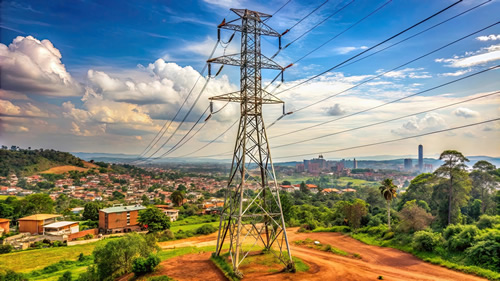- Perspective – November 2024
- Member News – Laser Welding Workshop
- Member News – SARS & Sassda Training Session
- Market Intelligence
- State of the Stainless Steel Nation
- NDE Advertorial
- Spotlight Series Feature – Nocwaka Ntshangase
- Spotlight Series Feature – Confidence Lekoane
- Spotlight Series Feature – Fiona Jacobs
- Spotlight Series Feature – Tholwana Mogowane
- New Member Profile – Multi Business Division
- New Member Profile – Lumax Energy
- Professional Profile – Daniel Beukes
- Case Study – Stainless Steel Grade Selection
- Africa Market Intelligence – Uganda
- Member Benefits
- Member News – GSSE Expo
- Sassda News
Uganda’s economic boom thanks to powerful projects and oil discoveries

Uganda, officially known as the Republic of Uganda, is a landlocked East African nation, celebrated for its natural beauty and strategic importance in the region. With a population of approximately 49 million (as of 2024) and a vibrant, diverse economy, Uganda offers promising opportunities for business and investment. Its capital, Kampala, serves as a dynamic hub for trade, finance, and innovation. Governed as a unitary presidential republic, Uganda’s political stability under President Yoweri Museveni has enabled significant strides in economic development, despite ongoing challenges.
Economic landscape
Uganda’s economy is a mosaic of agriculture, services, and industry, each playing a critical role in its development. Agriculture remains the backbone, employing 70% of the workforce and contributing significantly to exports. Coffee, Uganda’s flagship crop, stands as a leading foreign exchange earner, alongside tea, cotton, and sugarcane. The country is also seeing a surge in industrial activity, including manufacturing, construction, and mining, which together account for roughly 25% of GDP.
The services sector dominates Uganda’s economy, contributing 44% to GDP, driven by trade, transport, and a burgeoning tourism industry. The country’s diverse geography, ranging from volcanic mountains to vast savannas, provides the foundation for a thriving eco-tourism sector.
Uganda’s oil reserves, estimated at 1.4 billion barrels, are set to transform its economy. Projects like the East African Crude Oil Pipeline (EACOP) and the Tilenga Project are expected to make Uganda a key player in regional energy markets, with oil production slated to begin by 2025.
Combined with ongoing infrastructure projects, Uganda’s economy is poised for robust growth, with GDP projected to expand by 6% in 2024.
Major development projects
1. The Malaba-Kampala Standard Gauge Railway (SGR)
 Uganda is undertaking an ambitious rail infrastructure upgrade with the construction of the Malaba-Kampala SGR. This 273-kilometer railway will connect Uganda to the Kenyan SGR network, facilitating access to the Port of Mombasa and enhancing regional trade. The project, valued at €2.7 billion and led by the Turkish firm Yapı Merkezi, is expected to be completed by 2028. Designed to transport 25 million tonnes of freight annually, it is anticipated to reduce transportation costs and improve trade efficiency, reinforcing Uganda’s role in East Africa’s logistics network.
Uganda is undertaking an ambitious rail infrastructure upgrade with the construction of the Malaba-Kampala SGR. This 273-kilometer railway will connect Uganda to the Kenyan SGR network, facilitating access to the Port of Mombasa and enhancing regional trade. The project, valued at €2.7 billion and led by the Turkish firm Yapı Merkezi, is expected to be completed by 2028. Designed to transport 25 million tonnes of freight annually, it is anticipated to reduce transportation costs and improve trade efficiency, reinforcing Uganda’s role in East Africa’s logistics network.
2. Oil and Gas Development -
The discovery of significant oil reserves has ushered Uganda into a new era of energy production. The Kingfisher Field, operated by China National Offshore Oil Corporation (CNOOC), and the Tilenga Project, managed by TotalEnergies, are at the forefront of this development. These projects aim to produce over 270 000 barrels of oil per day at their peak.
Complementing upstream production, the East African Crude Oil Pipeline will transport crude oil from Uganda to the Tanzanian port of Tanga. This pipeline, coupled with the construction of a domestic refinery, positions Uganda as a future energy exporter, with annual oil revenues projected to exceed $1-Billion. However, environmental concerns surrounding biodiversity and local livelihoods present challenges that need careful management.
3. Kampala Metropolitan Transmission System Improvement
To meet rising energy demands, Uganda is upgrading its power infrastructure. The Kampala Metropolitan Transmission System Improvement Project involves constructing new substations and upgrading existing ones in strategic locations. Funded by the Japan International Cooperation Agency (JICA), this initiative will add 1 320 megawatts to the transmission grid, ensuring reliable electricity supply for Uganda’s urban and industrial growth.
4. Kikorongo-Bwera Road Rehabilitation -
Improved road connectivity remains a priority for Uganda. The Kikorongo-Bwera Road Rehabilitation Project aims to enhance a 38.2-kilometer stretch of road vital for regional trade and local community access. Managed by the Uganda National Roads Authority (UNRA), the project is expected to boost economic activity in western Uganda by facilitating the movement of goods and services.
Opportunities for investment
 Uganda’s strategic location at the heart of East Africa makes it an ideal gateway for regional trade. The country’s participation in projects like the East African Community (EAC) integration initiatives enhances its connectivity to neighbouring markets, including Kenya, Rwanda, and South Sudan.
Uganda’s strategic location at the heart of East Africa makes it an ideal gateway for regional trade. The country’s participation in projects like the East African Community (EAC) integration initiatives enhances its connectivity to neighbouring markets, including Kenya, Rwanda, and South Sudan.
Investments in infrastructure, particularly transport and energy, are expected to yield substantial returns. The government has created a conducive environment for foreign direct investment (FDI) through favourable policies and public-private partnerships. Additionally, Uganda’s oil boom, combined with a growing middle class, offers opportunities across sectors such as construction, financial services, and retail.
Challenges and outlook
While Uganda’s growth prospects are promising, challenges remain. High poverty levels, with approximately 40% of the population living below the international poverty line, underscore the need for inclusive development. Climate related risks also pose a threat to agricultural productivity, which is central to rural livelihoods.
Despite these challenges, Uganda’s economic trajectory is optimistic. Strategic investments in infrastructure, energy, and social services are setting the stage for sustained growth. For businesses and investors, Uganda represents a frontier market with abundant resources, a youthful population, and an evolving economic landscape ripe with opportunities.
Uganda is steadily positioning itself as a pivotal player in East Africa’s economic development. With strategic investments in infrastructure and energy, coupled with an emphasis on regional integration, the country is poised to become a hub for trade, industry, and innovation. For businesses looking to invest in a dynamic and emerging market, Uganda offers compelling opportunities across multiple sectors.

